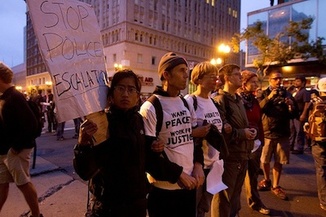|
10/28/2011 Comments Confessing Pacifism, Repenting in LoveBy: Nichola Torbett  A few weeks ago, I wrote a piece for this website that called for a confessing movement. Consider this my first confession, inspired largely by my participation in Occupy Oakland. Until recently, I have been what one of friends calls a “nonviolence fundamentalist.” Inspired by the movements of Mahatma Gandhi and Martin Luther King, Jr., among others, I have had a deep intuitive sense that our means of social change must be consonant with the ends we wish to achieve. If it is not just a reversal of oppressions that we seek to achieve but a real reign of love, then we must get there without straying from love. I believe this is also the message of the gospel, in which Jesus of Nazareth maintained his commitment to love, manifest in nonviolence, all the way to the cross and beyond, initiating a Reign of Love that is somehow both “at hand” now and yet not fully here, and by the tenants of which I am, as a disciple of Jesus, called to live now, no matter the cost. In an attempt to live out that discipleship, I have chosen to engage in justice struggles only when those struggles have been predicated on a strong commitment to nonviolence; as a result, there have been many movements with which I have not engaged and which I have sometimes even critiqued. These include many led by low-income communities of color. As woman with white-skin privilege and middle-class connections, I must repent of that now. Over the past few years, living in an inner-city neighborhood in Oakland, California, and struggling alongside powerful, righteous activists and movement intellectuals of color, my vantage point has changed. It is at least slightly easier, now, for me to identify with people who are multiply disenfranchised—by race, poverty, social class, lack of access to education, constant threat of violence and humiliation, and more—and who suffer the worst effects of a violent and exploitative network of social and economic systems. I see the police brutality. I see the impossibility of navigating through even those social safety net programs that exist. I see the near futility of trying to thrive under these circumstances. And part of what I’ve come to realize—and this is hard—is that so long as these social and economic systems exist, they do violence in my name and for my benefit, and so there is no way for me to claim to be nonviolent without perpetrating hypocrisy. I do violence with my tax dollars, my spending, my banking, my reliance on the police, and my very existence as a white-skinned person. What I have been practicing, mostly, is not nonviolence, but pacifism, or more precisely, passivity. I have been waiting around for the perfect opportunity to intervene with tactics amenable to me. Meanwhile, people continue to suffer. If I really want to practice nonviolence, I have to get in the way of the machine that is brutalizing living beings all over the planet. I have to lay my own life down, actively. There is this chilling point in each of the gospels at which Jesus turns and begins to walk steadily toward Jerusalem, the center of his culture’s violence, knowing full well what awaited him there. I repent of my passivity, of the ways that I have hidden behind a lot of talk about nonviolence while allowing violence to be committed in my name. I repent, too, of my lack of solidarity with people on the margins, my failure to participate in liberation movements that have offended my middle-class sensibilities. I have to confess that rhetoric like “f*ck the po’lice” and “eat the rich” has been more offensive to me, somehow, than have police brutality and the social and economic devastation of whole communities. Why is that? Might it have something to do with my own social position? Sure, some of my gut-level aversion is about doubting the effectiveness of name-calling and property destruction as tactics, but some of it is also, frankly, the enculturated, aspirational middle-class desire to be ingratiated to people in power. For example, last night, several people at the massive Occupy Oakland general assembly began to dismantle a fence the city had erected to keep us off the grassy area of city hall plaza after Occupiers had been brutally evicted early the day before. I urged against it, fearing that taking the fence down would bring on the police again. Now, I am still not sure that bringing the fence down was the smartest possible tactical move in that moment, but I also have to admit that much of my objection came out of fear and a kind of obsequious politeness that I really want to lose, or at least be able to violate when it serves justice. Nonviolence is not the same as niceness. It’s also not the same as endless empathy. When I was three years old and was pinned down and raped by an adult man, I would rather have been rescued by a violent person than one who got hung up on empathizing with my attacker or trying to figure out a nonviolent tactic for getting him off me. Unfortunately, I have been more of the latter for most of my life, vis-à-vis the communities that are currently being raped all over this country and all over the world. For that, I repent. Because I do confess Jesus Christ as Lord, I am constrained by the gospel to nonviolence, but there are two ways in which I am now thinking about this requirement differently. First, I believe that true, active nonviolence may, in extreme circumstances and as a last resort, involve the use of force. To be nonviolent, this force must be used in love—without fear or malice. This is no easy trick. Second, the yoke of nonviolence is one that I have taken on for myself. I do not believe that it gives me the right to critique the use of force by people who are more acutely affected than I by some form of oppression, especially if the oppression in any way benefits me, even indirectly. I am coming to believe that social change often comes as a result of a diversity of tactics—that, for example, the success of the civil rights movement may have required both the nonviolent resistance led by Martin Luther King, Jr., and the forceful insistence on self-determination articulated by Malcolm X. The fact that the dominant culture celebrates Martin more than Malcolm may have a lot more to do with what is acceptable to mainstream white, middle-class Americans than any measure of their effectiveness. I may have opinions about which tactics are the most appropriate for any given situation, and I can certainly give voice to those, but I must be clear that I am speaking about tactics, not about morality. In the end, nonviolence serves love; it is not synonymous with it. I am quite certain I will fail at this, over and over. God have mercy on me and all of us.
Comments
|
Disclaimer
The viewpoints expressed in each reader-submitted article are the authors own, and not an “official Jesus Radicals” position. For more on our editorial policies, visit our submissions page. If you want to contact an author or you have questions, suggestions, or concerns, please contact us. CategoriesAll Accountability Advent Anarchism Animal Liberation Anthropocentrism Appropriation Biblical Exegesis Book Reviews Bread Capitalism Catholic Worker Christmas Civilization Community Complicity Confessing Cultural Hegemony Decolonization Direct Action Easter Economics Feminism Heteropatriarchy Immigration Imperialism Intersectionality Jesus Justice Lent Liberation Theology Love Mutual Liberation Nation-state Nonviolence Occupy Othering Pacifisim Peace Pedagogies Of Liberation Police Privilege Property Queer Racism Resistance Resurrection Sexuality Solidarity Speciesism Spiritual Practices Technology Temptation Veganism Violence War What We're Reading On . . . White Supremacy Zionism ContributorsNekeisha Alayna Alexis
Amaryah Armstrong Autumn Brown HH Brownsmith Jarrod Cochran Chelsea Collonge Keith Hebden Ric Hudgens Liza Minno Bloom Jocelyn Perry Eda Ruhiye Uca Joanna Shenk Nichola Torbett Mark VanSteenwyk Gregory Williams Archives
October 2017
|
Search by typing & pressing enter


 RSS Feed
RSS Feed